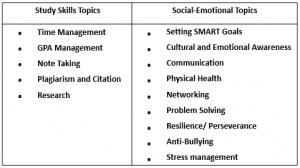The educational trend of developing “global citizens” capable of functioning in an increasingly connected, globalized society has created new needs surrounding both social and educational skill sets. This has been carefully monitored over the last 20 years (1993-2014) within the US, where international students numbers around the world have increased from 450,000 to nearly 886,000.
A recent study of 130 Chinese international undergraduate and graduate students [1] revealed that 45% of students had symptoms of depression and 29% had symptoms of anxiety. Potential adverse effects of intercultural differences on international students are not limited to transferring and/or dropping out of school, but also are often reflected in student mental health and development of academic skills.
Many schools do not have sufficient resources to assist international students in coping with cultural adaptation and integration issues.
Recognizing this need beyond the classroom, Cambridge Network is launching the Happy Student Initiative to help member schools “fill the gaps” and provide students with a more customized service package. This will have a tremendous impact on the confidence and trust schools, parents and agencies have in international student success.
With no increased cost to the student or school, this service upgrade will consist of two value-adding services:
- The Cambridge UP Online Course
- 30-Minute Weekly Face-to-Face Meeting
The Cambridge UP Online Course
- Purpose: to address the needs of Cambridge international students in order to develop social-emotional and study skills
- Curriculum created by our international student development and education experts; tailored to help overcome the unique challenges faced by our Cambridge students
- Length/Recurrence: 1 hour per week
- Platform: Zoom (unique link will be shared with each participant)
- Quarterly reports on the improvement of students’ soft skills will be shared with parents, schools and agencies
- Topics include: time management, GPA management, cultivation and integration of Chinese and American cultural awareness, communication with teachers/classmates/homestay parents, emotional guidance, stress management, and much more
Recommended Potential Addition:

Additionally, for our full service students – those who utilize Cambridge’s admissions, homestay and academic services – we have also made exciting improvements to our online College Preparation Language and Culture (CPLC) program. This program helps students solve frequently encountered cultural and academic English problems, but now has additional resources for increased customization and student-centeredness.
30-Minutes Weekly Face-to-Face Meeting
- Purpose: to ensure that students have sufficient connections with Cambridge and to build trust with the local Student Services Coordinator (SSC).
- Length/Recurrence: 30 minutes per student, per week
- Platform: In-person, preferably on the school campus or in the nearby community
- Conversation topics will include, but are not limited to: understanding the student’s weekly priorities and barriers, time management assistance, and discussion to help overcome social, emotional, and communication problems.
- The frequency of parent-facing reporting will be upgraded from once per month (minimum CSIET standards) to once per week.
All Cambridge SSCs have strong backgrounds in cross-cultural competency and experience in international student counseling, education or psychology. They are equipped with a deep understanding of the difficulties and pressures students face in a cross-cultural learning environment and can provide students with the help and guidance they need in developing solutions and establishing long-term goals.
Will Cambridge Network partner schools be impacted?
Cambridge schools are already being contacts by SSCs to reserve classroom/meeting spaces for the weekly 30-minute meetings. We want our staff to be a part of your team and community, and have found that parents are looking for more constant, detailed updates about their children’s academic and social development.
Together, both Cambridge and our partner schools must monitor how East Asian students studying in the US – particularly those in middle/high schools via Cambridge – can shift the trends of increased anxiety and depression among their peers and work to create a strong foundation for future success.
For any additional questions, please reach out to your Program Manager (PM) or Student Support Associate (SSA).
JA Chen,L Liu,X Zhao,AS Yeung. Chinese International Students: An Emerging Mental Health Crisis. Journal of the American Academy of Child & Adolescent Psychiatry, 2015, 54(11):879-880.
